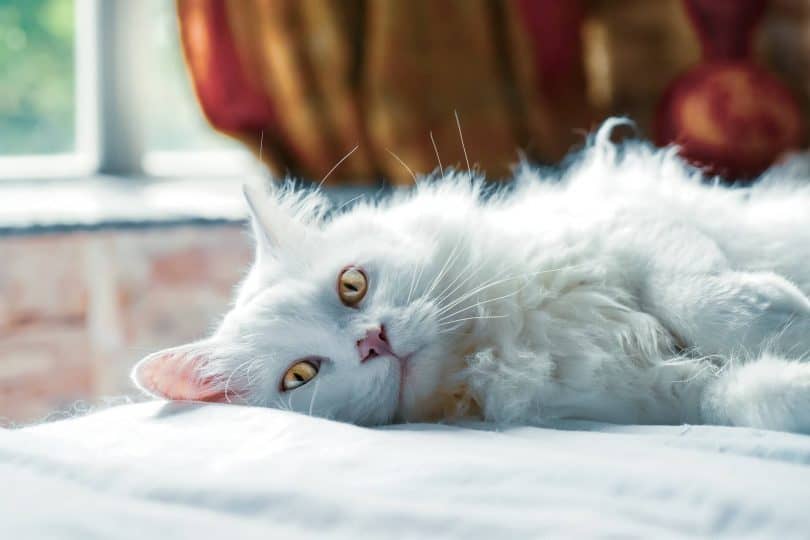Table of Contents
Why Is My Cat Throwing Up
Vomiting is a common problem in cats, but it should be a matter of concern for the owner if they vomit daily. It could be due to hairballs, inflammation, diabetes, urinary tract infection, or even cancer. There is the possibility of eating a toxic substance to cause severe damage inside the stomach.
Why Is My Cat Throwing Up Undigested Food
Vomiting undigested food can show something is not right with your cat. Perhaps cats are eating speedily that may lead to stuck the bigger particles inside the stomach.
Cats often overeat that may result in vomiting as the stomach will eject the unwanted meal out. Grooming hairs, house plants, grass, or any other foreign object will be rejected by the stomach, causing throwing up.
Food allergies are the most compelling reason for frequent vomiting. Right after a particular meal, your cat vomits undigested food means a kind of food allergy. Try to adjust to changing meal plans; it will ease by providing some relief.
The digestive system of the cat can trigger due to some chronic or acute inflammation. Irritable bowel syndrome is the supreme cause of cats throwing undigested food.
Throwing up solid food frequently should not be ignored, seek medical help to sort out the situation.
Why Is My Cat Throwing Up So Much
Vomiting is something your cat can do at any time of the day. However, that t doesn’t mean you should take it lightly. Reach out to clean the space; it is necessary but makes some effort to know its reason. If you found your cat doing it quite often, it is time to call your vet for further consultation.
Throwing up happens when the stomach doesn’t want the food the cat has eaten. It is the reaction of the digestive system for throwing its content out.
Remember that regurgitation is something different from vomit; it is not related to the strenuous muscle contraction. Regurgitation is generally seen in cats and happens after a few hours of eating. Through this process, the undigested food stuck in the esophagus is delivered outside.
When the cat throws up, she might be trying to find you, as it all snack extending that could strain the muscles. It is possibly due to gastric irritation. The possible cost consequence of your CAT overeating of food and trying to scarf down it quickly.
If you have more than one kitten, the best way to feed them separately will not try to swallow out of hassle. Give them small meals and observe their eating habit; they probably need your assistance to eat appropriately.
Cats are chewing indigestible stuff like grass, plastic, and rubber, which can affect the normal digestion process. Sometimes, food temperature can cause digestive issues and avoid giving too cold wet food to the cat. When you want to feed the cat with any processed or wet food item, let it get to the average temperature by keeping in the room.
Why Is My Cat Throwing Up White Foam
Cats go through recurrent vomiting episodes from time to time; mostly caregivers, it is considered healthy body function. It is essential to observe that the vomit is acute or chronic. If there are some other symptoms like diarrhea, you need to consider it as some serious issue. It calls for veterinary consultation to find any underlying cause of frequent vomit of white foam.
Vomiting is mostly a reliable indicator of irritation of the digestive system. Take a note of the vomit’s content to discuss it with the vet as it can appear as foam, blood, or food.
Sometimes vomit can occur due to some organ damage as the kidney, liver, or pancreas.
Pancreatitis
It can occur with another disease of the liver or gastrointestinal disorders, and diabetes may also lead to an acute or chronic dysfunction. Inflammation of some organs can lead to producing such conditions; it comes with other vomiting and diarrhea symptoms.
Hyperthyroidism
Thyroid glands located in the neck and work as the bodyguards to control hormone function in the body. It may work excessively to cause clinical issues in cats over 10years of age. Other related problems are weight loss, excessive thirst, and hunger, vomiting, diarrhea, and increased urination.
Hairballs
You might not believe it, but the white foam may be due to the hairballs. Cats can swallow hair during grooming job that can form balls into their stomach.
If the cat is throwing white foam while making hacking sounds, it could be due to a mess of hair in hairballs. It may end up in reducing appetite and severe constipation.
Keep an eye on your cat; if it is not eating up to 12-14 hours, a visit to the vet is a must. Staying hungry for longer can develop some severe hepatic disorders for cats. So a foamy vomit calls for acute observation.
Why Is My Cat Throwing Up Clear Liquid
If a cat is throwing up the clear liquid, the first step is to observe the behavior while keeping an eye on the fluid of the vomit. You need to pay special attention to the health of your CAT as not always; it might be the sign of something serious as well.
No need to panic; you can’t ignore the possibility of a toxin into your kitty body, which can result in vomiting of clear liquid. Cats are in the habit of licking and chewing various materials; this can result in some difficult situations. If some sticky liquid caught their paws, they would beat to clean it, and if you were not attentive, it could be a poisonous substance.
Why Is My Cat Throwing Up Bile
Most of the cat vomit bile like once in a week; if it is going to extend for twice or thrice during a week, you need to find its reasons.
Bile can be caused due to hairballs or kidney problems. It may also show the possibility of some infection or endocrine disorder.
Keeping an eye on the related symptoms will help you to know the root cause of vomiting bile. Usually, cats will try to hide from you, diarrhea, loss of appetite accompanied by vomit can make your pet weaker.
Why Is My Cat Throwing Up Brown Liquid
Vomit should consider dangerous in any case. It indicated some sort of illness. Brown can be a sign of some severe disease to be correlated with heatstroke, allergic reactions, internal obstructions, liver disease, and poisoning. If your cats puke brown vomit, there are chances that this regurgitation may hold some blood in it.
Observe the consistency of liquid to analyze the health condition of your pet. Don’t ignore the possibility of this liquid being a clotted blood coming from some damaged organ.
If it happens once in a week, do not need to get fret over this. There are several possibilities of this brown liquid as poisonous materials, plastic or sharp objects. After a few vomiting sessions, the cat will feel relief with an empty stomach, but don`t take it lightly if the condition persists for many days.
You must take your darling cat to the vet before it is too late to take action.
Why Is My Cat Throwing Up Food
Cats are food lovers. So, they overeat without considering their appetite, which leads to some health issues. The cat may throw up food because of excessive eating, eating inappropriate things, and sometimes due to eating too fast. They get to know their favorite food is in the dish. They get charged, feel amazingly happy, and cannot manage to wait for eating it impatiently. Instead, they react greedily and devour speedily. It creates turbulence in their stomach and eventually causes regurgitation.
Excessive Eating
Eating more than desire is also a common reason for vomit as they don’t focus on the optimum need of their stomach and do consume more than the ample quantity of meals. Consequently, their stomach expands immediately and comes to normal afterward, which leads the greedy to regurgitate.
Curiosity
Cats are fond of playing. While playing, they try to eat the stuff they are playing. So, eating indigestible like plastic bags, bitter leaves, plants, papers, and grass creates problems in their stomach, and they vomit.
Sometimes, swallowing something bigger without churning chokes their esophagus, which results in spewed out of their mouth.
Eating Too Fast
Sometimes, cats overeat and swallow too fastly. When a cat eats speedily, the stomach wall expands quickly, it then generates a signal and sends it to the brain it causes regurgitation. In this way, cats puke right after eating something or even while eating. Regurgitation food is also formed and smelly.
Why Is My Cat Throwing Up Water
Vomiting is not something healthy. It is a sign of suspicion that could be connected to multiple health concerns. Puke in the form of clear water means that the cat brings up the liquid from the digestive tract, which is often stomach juice.
Hairballs
Cats are naturally clean animals; they spend a large part of their day grooming themselves. The hook-like texture of the cat tongue catches the dead hair from its body and then swallowed. They all gathered up in the cat’s stomach. Usually, the cat vomits a clear liquid before vomiting hairball. Although a cat vomiting clear water with hairball can be healthy and nothing to worry about if it doesn’t happen frequently.
Indigestion
Alike human beings, cats also produce various acidic fluids as well as Hydrochloric acid present in the stomach. There is a thin lining between the gallbladder and the stomach. When the stomach is empty, a yellowish liquid released from gallbladder and mixed up with stomach acids and causes regurgitation. Moreover, If your cat skips meals, or make long delays in eating its feed, it can cause an empty stomach to throw its gastric acids upward. These acids turned in the form of smelly liquids and passed through the body as regurgitation.
Food And Dietary Changes
When there is any change in your cat’s feeding schedule, or if there are unusual delays in taking meals, it results in vomiting clear liquids.
Additionally, if you switch your cat’s diet too quickly, it can cause a disturbance. It is recommended that if you want to change the cat feed, do it gradually so that your cat’s stomach accepts it readily.
Why Is My Cat Throwing Up Foam
If your cat is throwing up foam, there could be different reasons. Which includes Indigestion, hairballs, Gastritis, and Irritate able bowel syndrome. Depending upon the appearance of vomit, you can diagnose the cause of vomiting foam.
Indigestion
Bile is an acidic fluid which helps indigestion. It is a thick yellowish liquid. Bile is created in the liver and stored in the gallbladder. Cats vomit bile when their stomach is empty. If your cat is throwing up bile frequently and feeling lazy and lethargic, consult a veterinary doctor urgently.
Hairballs
All cats lick their body to groom themselves. While licking unintentionally, they ingest the fur by doing this. However, sometimes they digest the fur and pass via poop, but mostly it is indigestible, so it gets piled up in the stomach. Where will they go now?
Eventually, your cat has to vomit to get rid of all that fur.
Gastritis
If your cat is naughty, it gets into the things it shouldn’t. In this case, there is a possibility that it can eat something which may disturb its stomach. An upset stomach will eventually lead to Vomits. It is the scenario in which cats vomit white foam or blood.
Irritateable Bowel Syndrome
Irritateable bowel syndrome is also known as inflammatory bowel disease. Cats are lactose intolerant. Therefore, when they take enough lactose quantity in the form of milk, it disturbs their stomach. So, excessive intake of milk can cause your cat to vomit foam.
Why Is My Cat Throwing Up Liquid
Vomiting itself is what is considered to be a nonspecific symptom. It could be associated with health concerns. Some of these can include hairballs, internal obstructions, eating quickly, constipation, indigestion, parasitic infections, poisoning, stress, depression, or even anxiety.
In these health issues, your cat may throw up liquid in different colors.
Is Your Cat Throwing Yellow Liquid?
It can be scary if your cat is vomiting persistently. You must not ignore it by just saying that you have a pukey cat.
Usually, the cat vomits brown, pink, white, and yellow liquids.
If your cat is throwing yellow liquid, that could be bile. Bile is the gastric juice created in the liver and stored in the gallbladder. It helps in digestion by mixing up in stomach acids. Alike humans’ cats also produced hydrochloric acids in the stomach, which supports stomach indigestion.
Keep an eye on your cat, if your dear is frequently vomiting, consult a veterinarian immediately. Untreated regurgitation can cause dehydration. It is considered exceptional if a cat puke 2 to 3 times a month, but you should act if it is often happening.
Why Is My Cat Throwing Up Blood
It is a matter of grave concern if a cat is vomiting blood. A trip to the veterinarian is a must to plan immediately as it could be the indicator of some life-threatening condition.
If this vomit persists for some days, your cat needs complete health evaluation. A blood vomit of a cat can be due to gastrointestinal disorder or other forms of internal bleeding. The blood may be fresh or either dark and streaky. It must be taken seriously to go for a consultation with the veterinarian. The vet will plan a few medical tests for further evaluation.
Common symptoms accompany with blood vomiting
- diarrhea
- dehydration
- lethargy
- shortness of breath
- pain
- fewer
- loss of appetite
Diagnoses Of A Cat Vomiting Blood
Physical examination, the vet may decide to perform some Diagnostic tests to know the reason behind the blood vomiting. It would be the best treatment protocol to tell about the disease first.
The vet will analyze the cat; besides, he probably performs and endoscopy, x-ray, or ultrasound based on the other related symptoms. Unfortunately, if cancer is suspected, the cat has to go through the gastrointestinal tract’s biopsy. We can take the sample of the vomit to find more effective results.
Treatment
The options of treatment depend on the underlying conditions of the cat. Remember, you have to make up your mind, and the chronic disease may require more aggressive treatment. If you keep yourself calm, you will be better able to handle your suffering pet. Acute conditions may be managed through drug therapy; no aggressive treatment for surgery is required. Probably a few days of hospitalization, along with win intravenous fluid therapy, can restore the electrolytes and fluid deficiency in the body.
Is the primary cause of bleeding was an ulcer; it can be prevented from the medication. However, it still depends on the severity of the disease and the lining of the stomach. Sometimes it was for the surgery to get rid of the chronic ulcers.
If The reason behind blood vomiting was cancer, you could look at different treatment options after discussing it with the vet. Surgery, chemotherapy, radiation, all possible solutions can be decided according to the stage of cancer.
Why Is My Cat Gagging and Not Throwing Up
Gagging is the ability of the cat to reject something that just ingested, especially something harmful. A typical healthy cat gags, but it is not always followed by vomit.
Getting is not sneezing, either not coughing, so what gagging is precise?
It is a physical response to the different cranial nerves, so cat gags when something touches to his lynx. You may see the cat widening his mouth and a neck extension for trying to swallow. A feeling of tickling in throat and that perceived as an effort of ejecting something.
When gagging comes across vomiting, it is a matter of concern, and it happens quite frequently; you can’t ignore the causes behind this. Cat frequently vomits twice or thrice a week, although it is a normal phenomenon for their digestive system; instead, it still calls for a vet visit. Better to make sure you are taking your cat once in a week to the vet for a proper health check-up.
The grooming habit of the cat ended up is making hairballs in their stomach. Cats can eject something harmful, so gagging can be their effort to get rid of something toxin. It might be hairballs, bone, string, or any other object with pointy edges. –
If you find your cat struggling with gagging and never stops, take light to check his throat, any foreign object might hinder the airways. Don`t try to experiment at home; take him immediately to the vet for treatment.
Gagging continuously without vomiting can indicate his struggle with some suspicious object stuck in the throat canal. Keep your cat neat and clean with brushing, take care of liquid intake to not get caught by dehydration. To prevent such emergencies, feed your cat with oil and butter, Use hairball gels and treats to avoid the severe gagging condition.
Key Takeaways
What kind of vomit cat can throw up?
- Food
- Water
- Blood
- Clear liquid
- Brown liquid
- Bile
- Foam
What could be possible reasons for frequent vomit?
- Bowel syndrome
- Hairballs
- Diabetes
- Hypothyroidism
- Cancer
- Renal disorder
- Ulcer
When to see the vet?
- Frequent vomit with associated symptoms of fever
- Pain and extreme lethargy
- Physical discomfort and seizures
- Bloody vomit
- Loss of apatite
- Unusual behavior
- Hiding in corners








